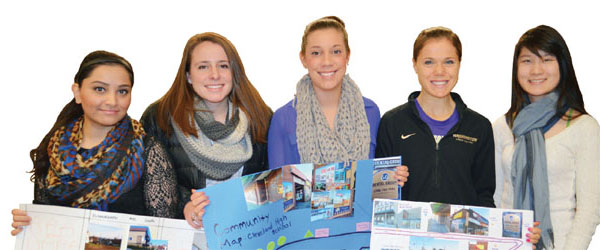Students at several Seattle-area high schools are learning how they can improve the health of their communities, thanks to a new UW School of Public Health program where undergraduates do the teaching.
Through a structured capstone class, teams of undergraduates majoring in public health aim to help their younger peers understand the wide-ranging factors affecting health and how they can speak up for change, whether by writing a letter to the editor or giving a persuasive two-minute talk.

SPH Seniors (L to R): Nilufar Rahman, Lindsey Allais, Alexandra Montano, Lindsay Flanagan, Therese Wang
"The goal is to educate high school students about public health and to empower them to make a difference," says Deb Hinchey, SPH clinical instructor of Health Services. "We want students to know how to advocate for improving their communities."
Seattle's Cleveland High School, Highline's Health Sciences and Human Services (HS3) High School, and Redmond High School are participating. Public Health – Seattle & King County helped set up the project.
A key strategy is teaching high school students to "map" areas near their schools, looking at all factors that affect health. Students are encouraged to suggest improvements while researching local resources that could help. Are there enough sidewalks or crosswalks? Are more bike racks needed to encourage cycling? Is safety an issue at local parks? What local agencies could be involved to effect change? Are there grocery stores with fresh produce?
According to Hinchey, there's a shortage of public health workers across America, especially in underserved areas. Empowered high school students could help fill the gaps. The program began as a pilot last spring at HS3 High School. Former graduate student Sara Colling devised a curriculum, and more than 70 students received concrete lessons in public health concepts from undergraduates who applied their coursework to a real-world setting.
This year, two high schools were added. Second-year graduate student Susana Tat (Community-Oriented Public Health Practice) revised the curriculum with more comprehensive lesson plans and detailed surveys for evaluation. "My goal was to train the undergraduates to teach by themselves," Tat said. "It's not possible for a grad student to be with them all the time."
The project is part of a renewed emphasis on "service learning" as a way to prepare SPH graduates to better serve the communities where they intend to work. The many partners working with Hinchey's students include the Refugee Women's Alliance, Union Gospel Mission, American Heart Association and Planned Parenthood.
